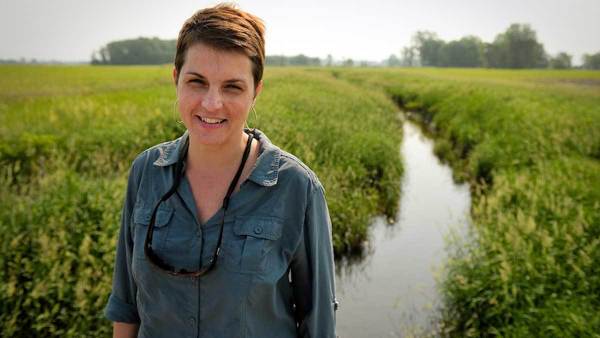
The Society for Freshwater Science has named Jennifer Tank, director of the University of Notre Dame’s Environmental Change Initiative (ND-ECI), as one of five 2020 fellows. Each year, fellows are selected “based on sustained excellence in contributions to freshwater science research, policy, or management.”
“I am honored to be named among the 2020 cohort of fellows,” said Tank, the Ludmilla F., Stephen J., and Robert T. Galla Professor of Biological Sciences. “As a former president of the society, I truly appreciate their commitment to supporting those who study freshwater ecosystems by establishing a community of researchers and helping us communicate science to policymakers, educators, and other community leaders.”
This is the third year the Society for Freshwater Science has selected fellows, who represent the national and international leaders of different areas of freshwater science. Prospective fellows must be nominated by a current society member, and each new class is selected by the past fellows.
“SFS Fellows are those who have led, shaped, and inspired the field of freshwater science,” said Amy Rosemond, current president of the society. “These scientists have been recognized for game-changing contributions to our field. They have pushed the boundaries of freshwater science in research, teaching, policy, and management and have advanced our understanding in these areas. They have also built and supported networks of scientific collaboration, increasing the capacity and reach of our science. All of our work is stronger as a result of their contributions.”
The Society for Freshwater Science is a premier international organization of aquatic scientists interested in an array of science endeavors including environmental impact, ecology, conservation, nutrient dynamics, and much more. Currently, the society has a membership of 1800 scientists which includes faculty and students from universities, as well as expert practitioners from around the world. Through a commitment to interdisciplinary and inter-institutional collaborations, the Society for Freshwater Science also supports a thriving mentorship program for young scientists.
In addition to Tank, other 2020 society fellows are Emily Bernhardt, the James B. Duke Professor of Biogeochemistry at Duke University; Lucinda Johnson, associate director of the Natural Resources Research Institute at the University of Minnesota; Valeria Souza, professor at the Universidad Nacional Autónoma de México’s Institute of Ecology, and R. Jan Stevenson, professor of integrative biology at Michigan State University.
To learn more about the Society for Freshwater Science and their fellows, please visit https://freshwater-science.org/.
At Notre Dame, ND-ECI brings together over 60 researchers across diverse disciplines to help people and ecosystems adapt to climate change, mitigate the effects of land use impacts, predict species occurrences in a shifting world and improve water quality. The initiative works hand-in-hand with partners to support research that matters to society, answering the most critical environmental questions of our time. To learn more about ND-ECI, please visit environmentalchange.nd.edu.
Contact:
Brandi Wampler / Research Communications Specialist
Notre Dame Research / University of Notre Dame
brandiwampler@nd.edu / 574.631.8183
research.nd.edu / @UNDResearch
About Notre Dame Research:
The University of Notre Dame is a private research and teaching university inspired by its Catholic mission. Located in South Bend, Indiana, its researchers are advancing human understanding through research, scholarship, education, and creative endeavor in order to be a repository for knowledge and a powerful means for doing good in the world. For more information, please see research.nd.edu or @UNDResearch.
Originally published by at environmentalchange.nd.edu on March 10, 2020.